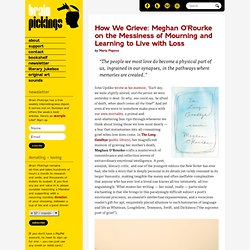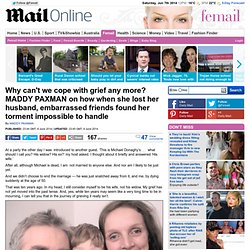

How broken heart syndrome PROTECTS the grief-stricken from dying. Around two per cent of people thought to have had a heart attack are diagnosed with the syndromeIt gives the heart a 'balloon-like' appearance but symptoms go after two weeks Published: 13:10 GMT, 27 June 2012 | Updated: 13:13 GMT, 27 June 2012 People who suffer from intense grief after the death of a loved one are often said to be at risk of dying from a broken heart after developing symptoms of cardiac arrest.

But scientists studying ‘broken heart syndrome’ have found the condition may actually have a protective purpose by stopping the organ being pumped with too much adrenaline. Around one or two per cent of people who are initially thought to have suffered a heart attack are diagnosed with the syndrome, also known as Takotsubo cardiomyopathy. 'Broken heart' syndrome most often affects grieving older women The same condition is sometimes seen in people who are injected with adrenaline to treat severe allergic reactions. How We Grieve: Meghan O’Rourke on the Messiness of Mourning and Learning to Live with Loss. By Maria Popova “The people we most love do become a physical part of us, ingrained in our synapses, in the pathways where memories are created.”

John Updike wrote in his memoir, “Each day, we wake slightly altered, and the person we were yesterday is dead. So why, one could say, be afraid of death, when death comes all the time?” And yet even if we were to somehow make peace with our own mortality, a primal and soul-shattering fear rips through whenever we think about losing those we love most dearly — a fear that metastasizes into all-consuming grief when loss does come. In The Long Goodbye (public library), her magnificent memoir of grieving her mother’s death, Meghan O’Rourke crafts a masterwork of remembrance and reflection woven of extraordinary emotional intelligence. O’Rourke writes: When we are learning the world, we know things we cannot say how we know.
It was like when you stay in cold water too long. So much of dealing with a disease is waiting. The Evolution of Grief, Both Biological and Cultural, in the 21st Century. Three months ago, I received an email informing me that a high school friend, Pat, had died.

I read his obituary and my body stopped functioning. I froze on the spot, limbs tense but trembling. My mouth went dry, my vision blurred. As I waited for my train in the packed station, I could barely stand as my muscles turned to jelly and legs folded beneath my body. I tried to maintain composure in the public space, but my contorted face betrayed my sorrow. It was shocking to me: I felt real physical pain — a biological response brought about by stress hormones — in response to death.
Evolutionary biologists think that grief is passed on not because it provides benefit in itself, but rather it is a side effect of having relationships. In more social animals, such as humans, those reciprocal relationships extend beyond parent-child. This idea was endlessly comforting in my mourning. Grief is the price we pay for friendship. Digital love The onslaught of mourning continued, nonetheless. Why can't we cope with grief any more? MADDY PAXMAN on how when she lost her husband, embarrassed friends found her torment impossible to handle.
By Maddy Paxman Published: 23:44 GMT, 6 June 2014 | Updated: 23:45 GMT, 6 June 2014 At a party the other day I was introduced to another guest.

‘This is Michael Donaghy’s . . . what should I call you? His widow? His ex?’ After all, although Michael is dead, I am not married to anyone else. And we didn’t choose to end the marriage — he was just snatched away from it, and me, by dying suddenly at the age of 50. That was ten years ago. Devoted: Maddy and Michael picutred with their son Ruairi - who was just eight when his father suddenly passed away Michael and I had been together for 21 years — almost my entire adult life. Our child, Ruairi, was just eight when his dad died; he’s now a lovely young man of 18 and looks more like his father every day. Michael was hard-wired into my brain and in many ways still is. That’s not to say that I blame those who don’t understand the long and complicated process of mourning. My journey in grief began one Sunday morning in 2004.